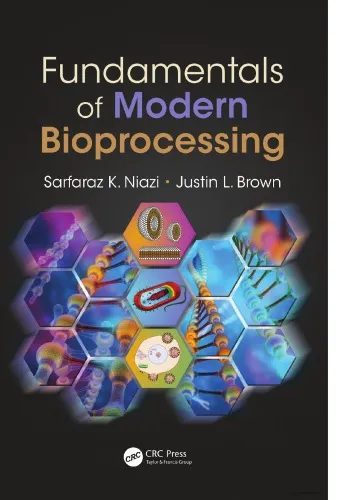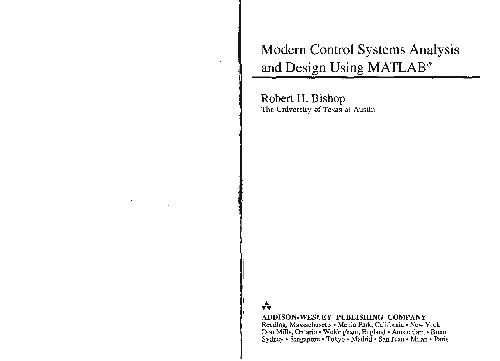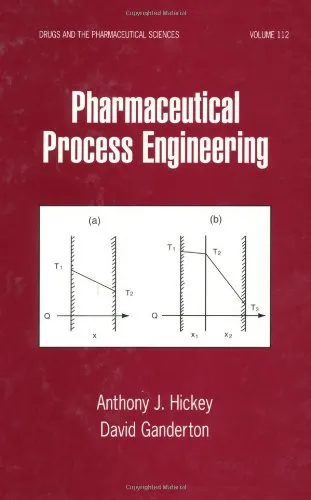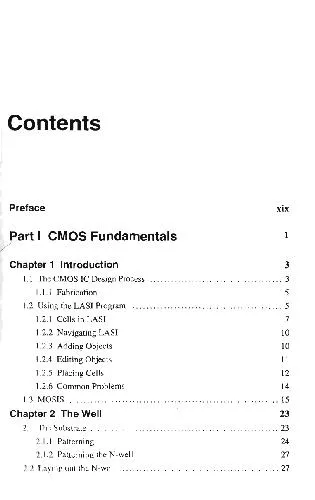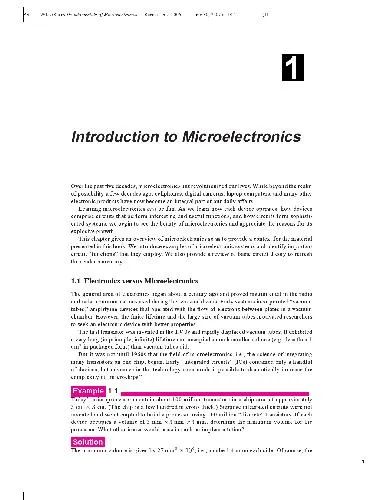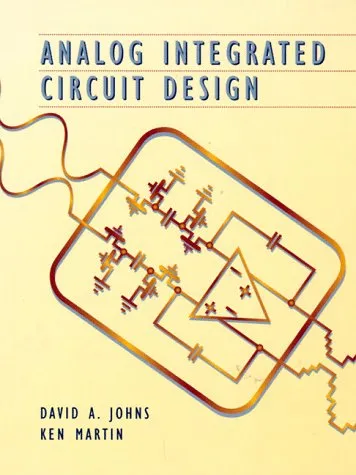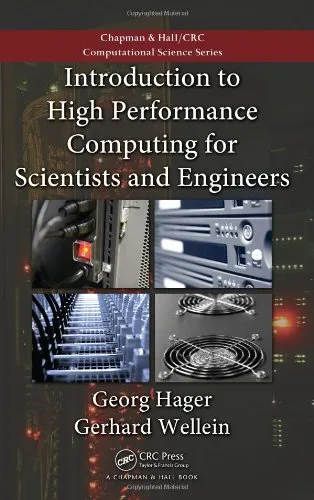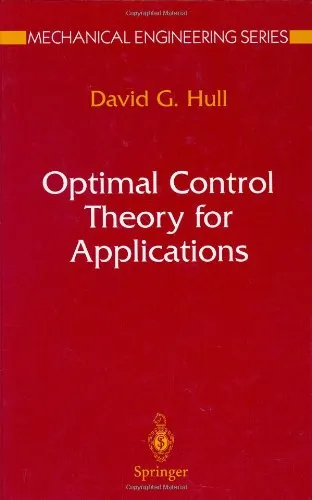Fundamentals of Modern Bioprocessing
4.5
بر اساس نظر کاربران

شما میتونید سوالاتتون در باره کتاب رو از هوش مصنوعیش بعد از ورود بپرسید
هر دانلود یا پرسش از هوش مصنوعی 2 امتیاز لازم دارد، برای بدست آوردن امتیاز رایگان، به صفحه ی راهنمای امتیازات سر بزنید و یک سری کار ارزشمند انجام بدینکتاب های مرتبط:
معرفی کتاب "Fundamentals of Modern Bioprocessing"
کتاب "Fundamentals of Modern Bioprocessing" نوشتهی "Sarfaraz K. Niazi" و "Justin L. Brown" یکی از مهمترین و جامعترین منابع در حوزه بیوفناوری و فرایندهای زیستی است که به بررسی اصول، مفاهیم پایهای و کاربردهای پیشرفته در این زمینه میپردازد. این کتاب نه تنها برای محققان، دانشجویان و متخصصین این حوزه کاربرد دارد، بلکه به عنوان مرجعی ارزشمند برای آشنایی با روشهای تولید صنعتی زیستمحور نیز شناخته میشود.
خلاصهای جامع از کتاب
این کتاب در ۱۰ فصل جامع تنظیم شده و به طور دقیق به مراحل مختلف bioprocessing از طراحی، مدلسازی گرفته تا تولید پایدار محصول میپردازد. فصلهای اول کتاب بر مبانی اصول فرآیند زیستی تمرکز دارد که شامل بررسی سلولها، محیطهای زیستمحیطی و نقش آنزیمها میباشد. سپس در فصلهای بعدی به مباحث پیشرفتهتری مانند طراحی bioreactorها، optimization فرآیندها و بررسی سیستمهای کنترل و نظارت پیشرفته پرداخته میشود. یکی از بخشهای جالب توجه این کتاب، تأکید بر کاربرد هوش مصنوعی و Machine Learning در پیشبینی و بهینهسازی مقادیر و متغیرهای فرآیندی است. در نهایت این کتاب چالشها و فرصتهای بالقوه در Biopharma و توسعه پایدار فرایندها را مورد تحلیل قرار میدهد.
نکات کلیدی کتاب
- بررسی جامع فرایندهای اصلی زیستی از قبیل Upstream Processing و Downstream Processing
- آشنایی با تکنولوژیهای cutting-edge نظیر Bioreactor Design و Bioprocess Modeling
- رویکرد مدرن به Sustainability و مقیاسگذاری منابع زیستی
- بررسی کاربردهای Bioinformatics و تکنیکهای Big Data در افزایش بهرهوری
نقلقولهای معروف از کتاب
"In the realm of bioprocessing, innovation lies at the crossroads of biology and engineering."
"Bioprocessing has the power to reshape industries, from pharmaceuticals to sustainable energy."
چرا این کتاب اهمیت دارد؟
با رشد روزافزون Bioindustry و تقاضای بیشتر برای محصولات زیستمحور، دانش در زمینه بیوفناوری اهمیت بیشتری پیدا کرده است. این کتاب راهنمایی بینقص برای درک عمیق بیوفراوری و چگونگی طراحی سیستمهایی برای تولید دارو، مواد غذایی، سوختهای زیستی و محصولات صنعتی دیگر است. علاوه بر این، کتاب "Fundamentals of Modern Bioprocessing" تمرکز ویژهای بر ملاحظات اقتصادی، زیستمحیطی و اجتماعی فرآیندهای زیستی دارد، که آن را به منبعی ضروری برای متخصصان و دانشجویان تبدیل کرده است.
Introduction to Fundamentals of Modern Bioprocessing
The field of bioprocessing is a cornerstone of biotechnology and molecular biology research, playing a critical role in the development of pharmaceuticals, biologics, and vaccines. Fundamentals of Modern Bioprocessing, written by Sarfaraz K. Niazi and Justin L. Brown, serves as a comprehensive guide for students, professionals, and researchers seeking to master the complexities of this essential discipline. With its unique blend of theoretical insights and practical applications, this book is a cornerstone of any bioprocessing curriculum or industry library.
Whether you are a novice looking for a foundational understanding or an expert aiming to refine your knowledge, this book walks readers through the principles, methodologies, and real-world challenges that define the bioprocessing industry. By covering everything from upstream processing to downstream purification, this book is an authoritative resource for navigating the dynamic and ever-evolving biotechnology landscape.
Detailed Summary of the Book
The text not only breaks down the fundamental principles of bioprocessing but also provides actionable knowledge for real-life applications. The authors have divided the book into sections that focus on upstream processes, downstream purification, process modeling, quality control, and regulatory considerations. It emphasizes the importance of innovation in bioprocess design while adhering to stringent industry standards.
Beginning with core scientific principles, this book explains cell culture, microbial fermentation, and genetic engineering techniques aimed at creating biopharmaceuticals. The upstream sections offer insights into various biological systems, from bacterial to mammalian, used for production, supported by case studies showcasing scalable successes.
In the downstream processes, advanced separation and purification methods are meticulously detailed. Topics like chromatography, ultrafiltration, and crystallization are discussed in depth to ensure product quality. Additionally, the book sheds light on cutting-edge techniques in bioprocess modeling, computer-aided process design (CAPD), and process intensification to meet modern demands for high efficiency and sustainability.
The regulatory and quality aspects are particularly important. FDA and EMA guidelines, Good Manufacturing Practice (GMP), and the challenges of achieving regulatory compliance are thoroughly dissected. This book is not just technical—its holistic perspective integrates ethical considerations and the societal implications of bioprocessing innovations.
Key Takeaways
Here are the most valuable insights and lessons you can expect to gain from this book:
- A comprehensive understanding of upstream bioprocessing technologies, including cell culture and fermentation methods.
- Detailed knowledge of downstream purification processes to ensure product integrity and scalability.
- State-of-the-art bioprocess modeling and design techniques to optimize efficiency and reduce costs.
- Insight into FDA, EMA compliance standards, and the importance of regulatory frameworks in biotechnology.
- An understanding of quality control principles, Good Manufacturing Practices (GMP), and risk mitigation strategies.
Famous Quotes from the Book
The authors provide numerous thought-provoking insights throughout the book. Here are a few memorable quotes to inspire readers:
"In an era of rapid technological advancement, bioprocessing encapsulates the delicate balance between scientific innovation and societal responsibility."
"The core of bioprocessing is not merely achieving efficiency, but ensuring safety, scalability, and sustainability in every system we design."
Why This Book Matters
Fundamentals of Modern Bioprocessing is more than just a textbook; it is a vital resource in a field that drives innovation in medical, environmental, and industrial applications. As the demand for biologics continues to grow, understanding bioprocessing technologies is of paramount importance. This book equips individuals with the knowledge and skills needed to thrive in roles that directly impact public health and environmental sustainability.
The bioprocessing landscape is highly dynamic, requiring the ability to adapt to new techniques, ethical considerations, and regulatory frameworks. This book serves as a roadmap in navigating these complexities, offering actionable strategies that are both practical and visionary. For professionals in the field, it is an indispensable tool to stay competitive. For students, it provides the foundational knowledge necessary to make informed, impactful contributions to the science of biotechnology.
دانلود رایگان مستقیم
شما میتونید سوالاتتون در باره کتاب رو از هوش مصنوعیش بعد از ورود بپرسید
دسترسی به کتابها از طریق پلتفرمهای قانونی و کتابخانههای عمومی نه تنها از حقوق نویسندگان و ناشران حمایت میکند، بلکه به پایداری فرهنگ کتابخوانی نیز کمک میرساند. پیش از دانلود، لحظهای به بررسی این گزینهها فکر کنید.
این کتاب رو در پلتفرم های دیگه ببینید
WorldCat به شما کمک میکنه تا کتاب ها رو در کتابخانه های سراسر دنیا پیدا کنید
امتیازها، نظرات تخصصی و صحبت ها درباره کتاب را در Goodreads ببینید
کتابهای کمیاب یا دست دوم را در AbeBooks پیدا کنید و بخرید
1397
بازدید4.5
امتیاز0
نظر98%
رضایتنظرات:
4.5
بر اساس 0 نظر کاربران
Questions & Answers
Ask questions about this book or help others by answering
No questions yet. Be the first to ask!
